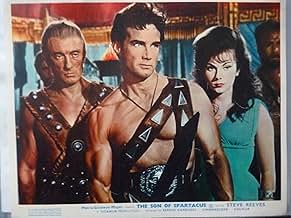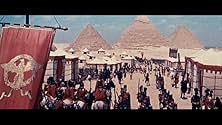AVALIAÇÃO DA IMDb
5,9/10
658
SUA AVALIAÇÃO
Durante a luta de poder entre César e Crassus, um centurião romano, que é o filho há muito perdido de Spartacus, é enviado ao campo de Crassus para observar seus movimentos e manter César in... Ler tudoDurante a luta de poder entre César e Crassus, um centurião romano, que é o filho há muito perdido de Spartacus, é enviado ao campo de Crassus para observar seus movimentos e manter César informado.Durante a luta de poder entre César e Crassus, um centurião romano, que é o filho há muito perdido de Spartacus, é enviado ao campo de Crassus para observar seus movimentos e manter César informado.
- Direção
- Roteiristas
- Artistas
Ahmed Ramzy
- Murdok - a Lybian Chief
- (as Ahmad Ramzi)
Abdulmuniem Abdulrahman
- Slave
- (não creditado)
Hussein Al-Meliguy
- Slave
- (não creditado)
Abdel Hameed Badawy
- Slave
- (não creditado)
Ala Badruddin
- Rebel Slave
- (não creditado)
Avaliações em destaque
This film, made at the twilight of Mr. Reeves film career, is certainly one of his best. The location work in Egypt and a rather big budget look add a great amount of, shall I say it?, realism to an essentially escapist, fantastical genre- the Italian sword and sandal flicks of the 1958-64 period. This picture also features some extremely diabolical villainy on the part of Crassus. Sir Laurence Olivier wasn't nearly this outrageously evil playing the same character in SPARTACUS! Steve's dilemma is pretty heavy in this one, doing a complete 180 from up and coming Roman centurions to advocate warrior of the freedom movement for the slaves of Rome. The action scenes stand up pretty well after 40 plus years.
From Sergio Corbucci, director of the classic spaghetti westerns "The Great Silence" and "Django," comes a routine, but serviceable Italian sword-and-sandal epic staring Steve Reeves, best know for his many Hercules films. This was Reeves final on-screen appearance in this particular genre, later moving onto pirate and western films. "The Slave" has Reeves cast a Roman soldier who discovers he's actually the son of Spartacus, a slave turned gladiator turned rebel leader against the Roman Empire. Like his father, Reeves ends up leading a slave revolt. Unlike the Stanley Kubrick version of Spartacus, this film is minus interesting characters, dialogue, and narrative. However, Corbucci does bring strong visuals to the film and the production values of "The Slave" is better than most Italian sword-and-sandal pictures, which makes this film worth checking out for fans of these admittedly silly films.
"The Slave" (aka Son of Spartacus) is a an excellent action Reeves film with a good story line to borrow from (the original Spartacus). Reeves learns of his heritage after being captured by a band of slave drivers in the Egyptian desert - also tagging along is a beautiful slave girl who along with Reeves survives being dumped overboard by a ship which hits a barge in the River. Great scene,when Reeves doubtful that he is Spartacus's son walks slowly into a small catacomb and finds the helmet and sword of Spartacus and muses for several minutes about his heritage - linking a medallion he has worn since birth with the same emblem on the sword handle of Spartacus. Also great action scene when Reeves rescues a band of prisoners of Ceasar Crassus who are tied into a large moat with water rushing in to cause a drowning execution. Excellent sword and action with several bad guys being wiped out by Steve, looking like an adonis with a metal helmet on in a great swashbuckling scene.....Reeves as a tribune of Ceasar finally realizes as did his dad, Spartacus, that the Roman empire cannot survive as a slave empire.....reluctantly Ceasar realizes it also and gives Reeves and his slave followers their freedom. Good cloak and dagger role for Steve as he poses as a tribune working for Caesar and also as the Son of Spartacus - wearing an impressive full head helmet to complete his disguise.
good
good
This is one of Steve Reeve's best ever films and possibly the last one in which he was in a tribune or Roman centurion costume...... Italian director Sergio Corbucci conconted up an idea to continue the life of Spartacus with Reeves as his son gaining a large measure of revenge on corrupt Roman counsel Ceasar Crassus who is running an illegal corrupt empire right in the heart of roman territory....In fact Crassus is getting so powerful that Ceaser himself sends Reeves to investigate what Crassus's methods are and report back to Caeser. Along the way on his trip to see Crassus the ship that Reeves is in hits a river barge and dumps him and a lovely Italian slave named Saida into the river. Reeves survives and he and Saida walk through the roman desert unaware that slave drivers are rounding up all the slaves they can to be bought and sold. Reeves and his gal are captured and Reeves breaks loose from the pack and wreaks his revenge on slave leaders with some dazzling sword work, wiping out a flock of slave drivers. One of the members of the slave band recognize a medallion worn by Reeves as the symbol of Spartacus, since the slave member was a member of Spartacus's force twenty years earlier. Reeves initially is unconvinced that he is truly the son of Spartacus and muses in a catacomb about his true identity. He sees the sword handle of Spartacus and it is the same talisman as his medallion. Reeves recognizes his true heritage and goes to work on wiping out Crassus and his evil empire......raid by raid Reeves and his band wipe out Crassus's gang all the while maintaining his identity as a roman centurion from Caesar.....in the end Reeves is caught and given a death sentence by Crassus....his followers then free him and Caesar must make a decision as to whether or not Reeves followed his orders as a true centurion. Caesar gives Reeves a death sentence but Reeves followers come to his rescue and Caesar relents. Good love story and the beautiful Ombretta Colli is Reeves's love interest. After this film Reeves became "Sandokan" and made one western in 1966 before retiring for good. I just love this film and Reeves had that marvelous physique that made any man drool!!!!! The immortal Steve Reeves, what a face and a body......
After the international success of HERCULES, the Steve Reeves Swords-and-Sandals vehicle THE SLAVE clearly had some money spent on its production values -- good costumes and some nice sets to accent good camera lighting abound. The plot, typical of peplum movies, is a mishmosh of themes intended to take advantage of recent hits.
Reeves is a Roman centurion working for the noble Julius Caesar in Rome. He is captured by leopard-skin wearing desert barbarians working for the evil Crassus, escapes, gets captured again, is enslaved, identified as Spartacus' son (hence the movie's Italian title) and leads a slave rebellion.
Director Sergio Corbucci does his usual highly competent job, abetted by the handsome production values that Cinecitta was capable of; kudos especially to director of Photography Enzo Baroni, whose lighting suggests illustrations on parchment. Although the writing never rises above the level of silliness that such cheap epics aspired to, fans of the genre will find plenty to enjoy.
Reeves is a Roman centurion working for the noble Julius Caesar in Rome. He is captured by leopard-skin wearing desert barbarians working for the evil Crassus, escapes, gets captured again, is enslaved, identified as Spartacus' son (hence the movie's Italian title) and leads a slave rebellion.
Director Sergio Corbucci does his usual highly competent job, abetted by the handsome production values that Cinecitta was capable of; kudos especially to director of Photography Enzo Baroni, whose lighting suggests illustrations on parchment. Although the writing never rises above the level of silliness that such cheap epics aspired to, fans of the genre will find plenty to enjoy.
Você sabia?
- CuriosidadesThis marked the final Italian sword and sandal/mythological muscleman movie to be made by Steve Reeves. He would make several "Sandokan" movies and a spaghetti western before retiring from the screen.
- Erros de gravaçãoThe story takes place during the triumvirate of Crassus, Caesar and Pompey (65-60 BC), but when Crassus talks with Verulus and Randus, with the Sphinx serving as background, it is plain that the monument has already lost its nose - a fact that would take place 1850 years later.
- Citações
La schiava Seila: [to Randus] My friend, my life... is you - my love!
- Versões alternativasThe Italian theatrical version had a 101 minute running time, with minor censorship cuts for violence. The foreign versions, namely the UK (Son of Spartacus), the USA (The Slave), the German (Der Sohn des Spartakus), and the Finish, run over 102 minutes. Although unconfirmed, there are video versions in Italy and France cut to 97 or 95 minutes.
- ConexõesFeatured in Cheezy Fantasy Trailers (2006)
Principais escolhas
Faça login para avaliar e ver a lista de recomendações personalizadas
- How long is The Slave?Fornecido pela Alexa
Detalhes
- Tempo de duração1 hora 40 minutos
- Proporção
- 2.35 : 1
Contribua para esta página
Sugerir uma alteração ou adicionar conteúdo ausente

Principal brecha
By what name was O Filho de Spartacus (1962) officially released in India in English?
Responda





























